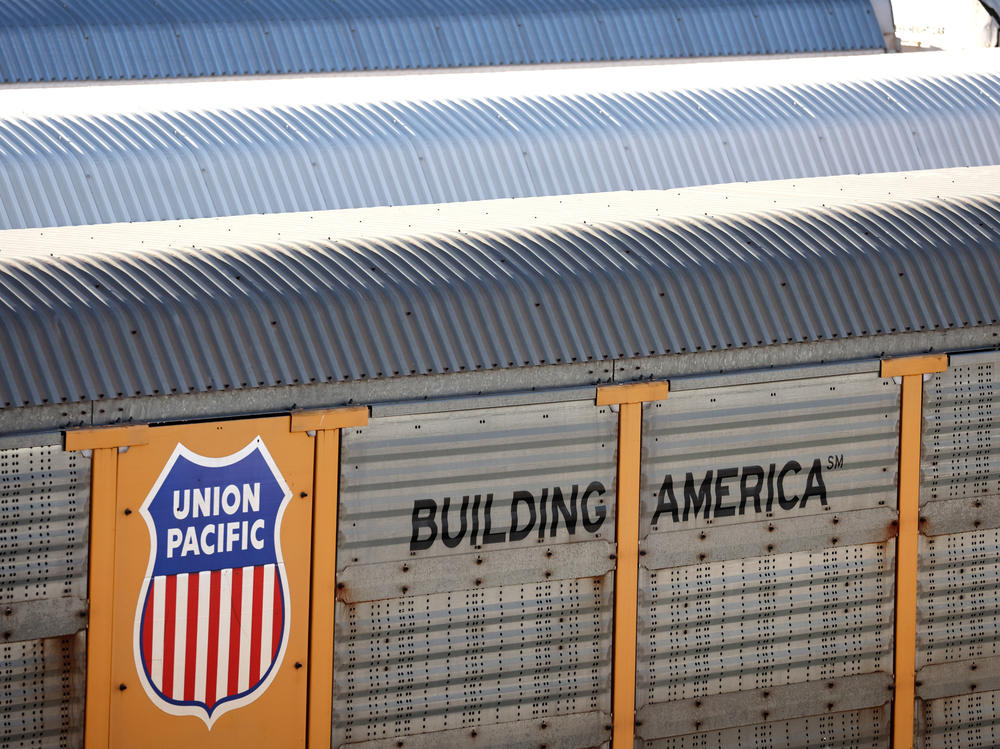Section Branding
Header Content
Some rail workers say Biden "turned his back on us" in deal to avert rail strike
Primary Content
Matthew Weaver was excited earlier this week — even optimistic — as he and a coworker hung drywall at a rail yard in Lordstown, Ohio.
The House of Representatives had just voted on a resolution to give freight rail workers seven days of paid sick leave — something Weaver's union had been fighting for in recent months.
But as the hours passed and the legislation moved onto the Senate, Weaver's doubts grew. Sure enough, the measure failed in the Senate.
So on Friday morning, after three years of failed negotiations, President Biden instead signed into law a measure that imposes the contract agreement brokered by his administration back in September, a deal that gives workers a 24% raise over five years, caps on health care premiums, and one additional personal day, but no paid sick days.
"It's very frustrating," says Weaver, a railroad carpenter since 1994. "Here is America's essential workers — rail workers. We have no paid sick days. It's disgusting."
Biden urged Congress to pass legislation without any modifications or delay
Four of the 12 freight rail unions, collectively representing more than half of the 115,000 freight rail workers covered by the deal, had voted down the agreement, citing the lack of paid sick days as a primary reason.
Workers who voted no say they are frustrated and disappointed — especially with President Biden, who on Monday called on Congress to pass legislation to adopt the tentative agreement with no modifications in order to avoid a crippling rail strike.
"It feels like President Biden ushered this in a little too early," says Weaver. "He kind of cut us off at the knees on our ability to have some real negotiations or real change after voting no."
In Richmond, Virginia, roadway mechanic Reece Murtagh says it sets a bad precedent when even the most pro-labor of presidents will force an agreement rather than allow workers to strike.
"In future negotiations, the carriers are going to remember that and use it against us," says Murtagh. "It's going to be even harder for us to negotiate a fair contract because they realize when it comes down to it, there's not going to be a strike."
Murtagh says guys in his shop felt especially disillusioned thinking back on Biden's decades in the Senate, when he'd take Amtrak home to Delaware every night.
"Joe relied on us to get him home to his family," Murtagh says. "But when it was his turn to help us out... to better our life, he turned his back on us."
On Monday, Biden acknowledged it was a tough move to make.
"As a proud pro-labor President, I am reluctant to override the ratification procedures and the views of those who voted against the agreement," he said in a statement. "But in this case – where the economic impact of a shutdown would hurt millions of other working people and families – I believe Congress must use its powers to adopt this deal."
As he signed the rail legislation into law on Friday, Biden didn't dodge the issue.
"Look, I know this bill doesn't have paid sick leave that these rail workers and frankly every worker in America deserves. But that fight isn't over," he said. "I've supported paid sick leave for a long time. I'm going to continue that fight 'til we succeed."
Workers will get back raises and bonuses
Because the new contract covers a five-year period dating back to 2020, workers will see an average payout of $16,000 in back raises and bonuses within about 60 days, according to the Association of American Railroads. The trade group also says by the end of the contract, total average annual pay and benefits will reach $160,000 a year.
"Let's be clear railroading is tough, essential work that keeps our nation moving, and our employees deserve our gratitude for moving America's freight and doing so safely every day," said AAR president and CEO Ian Jefferies. "Without a doubt, there is more to be done to further address our employees' work-life balance concerns, but it is clear this agreement maintains rail's place among the best jobs in our nation."
Weaver, the railroad carpenter, disagrees. He expects to see a wave of departures once the back pay and bonuses are paid out.
"In Toledo where I live, there's refinery jobs, there's trucking jobs, there's many other crafts out there that pay better and [where] they get respect from their employer," he says. "That's the problem. Working conditions, attendance policies, lack of respect, militant discipline — we're really suffering."
Still, when asked if he'd consider leaving his career of 28 years, Weaver says probably not.
"I'm pretty much an old fart," he says.
Copyright 2022 NPR. To see more, visit https://www.npr.org.

